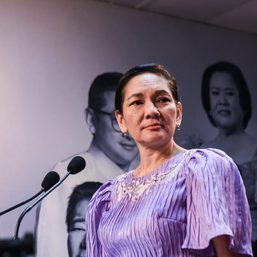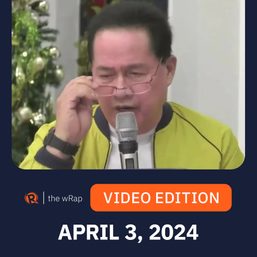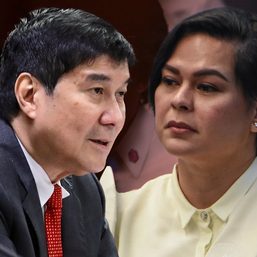SUMMARY
This is AI generated summarization, which may have errors. For context, always refer to the full article.
![[Newsstand] What do we do about Alice Guo?](https://www.rappler.com/tachyon/2024/05/What-do-we-do-about-Alice-Guo.jpg)
Without access to the so-called military “intel” that has reportedly reached some senators, I can only conclude from her answers in two Senate hearings that Alice Guo, the mayor of Bamban, Tarlac, is a willing corporate dummy.
There IS reason to think that she was a mere stand-in for some principal. She said she didn’t know who some of her fellow incorporators were (even though some of them were also listed as incorporators in other businesses she was a part of); she said she didn’t know how much rental income the Baofu compound in Bamban earned, even though she said that before divesting she owned 50% of the company; she said she couldn’t say exactly how much her businessman-father gave her, or how often, but only that the money came in large amounts – half a million, or a million, or 2 million, at a time.
There IS reason for the Presidential Anti-Organized Crime Commission (PAOCC), which led the raid on the Philippine offshore gaming operator (POGO) located in the compound, to believe that she remains involved in Baofu. Part of the evidence trail leads back to her: A letter of no objection she filed on behalf of Hongsheng Gaming Technology, the original company with a POGO license; utility statements for Hongsheng up until November 2023, six months after its license had been canceled and over a year since Guo became mayor; a vehicle in the compound registered to her; a current Tarlac Electric Cooperative bill in her name and title (“Mayor Alice Guo, Pandan, Bamban”).
There IS reason for the Department of the Interior and Local Government to seek her preventive suspension. The mystery of the missing grinders and grinder operators is proof of the kind of costly foot-dragging that a sitting mayor can force an entire bureaucracy to adopt. One Friday after the raid, PAOCC enlisted the cooperation of Bamban-based grinder operators to open all the 27 safes and vaults found in the compound the following Monday. That Monday, none of the equipment could be found, and all the operators, whether working for the municipality or in the private sector, were away on what PAOCC was told was a town-sponsored seminar. PAOCC ended up using acetylene torches.
And there IS reason for the public to suspect her citizenship was not genuine. The discrepancies in the wedding dates of her listed parents as recorded in her birth certificate (registered when she was already 19) and in the birth certificates of two of her siblings; her own insistence that her father was a Chinese national but all the children’s birth certificates identified him as Filipino; the negative certification from the Philippine Statistics Authority that there is no record of birth of either Angelito Guo or Amelia Leal and no record of their marriage – these irregularities are concerning.
But of equal concern, in my view, is the heat and hate, the virulent vitriol, of public opinion about her. Two aspects of the current public discourse swirling about Mayor Guo should give us pause.
Filipino racism
In the May 22 Senate hearing, committee chair Senator Risa Hontiveros was careful to say at the start that the issue of Mayor Guo’s citizenship was directly related to the issue under investigation – if unscrupulous operators were using POGO as legal cover to run criminal syndicates that trafficked in persons and forced them into criminal acts. Whether Guo is a Filipino citizen is germane to her ownership of various companies, and of course to her eligibility as mayor.
The controversy caused by her two appearances in the Senate has generated a tsunami of social media memes. In my own view, the funniest, but also the most searing, was the juxtaposing of two captioned images from two Senate hearings: above, Guo shown speaking her most memorable line (“Lumaki po ako sa farm” – literally, I grew up on a farm), and below, Senator Cynthia Villar, wife of the country’s richest man and symbol of a business empire with a reputation for turning agricultural land into commercial property, with the imagined caption “Saang farm ba ‘yan (Where is that farm)? A joke very like a condominium: Many levels!
But together with all the funny came all the ugly. Guo has been deservedly criticized for her lapses in memory or general evasiveness, but she has also been hated on, insulted, mocked, reviled, for how she looks, how she sounds, how her tongue moves, how Chinese she must be. That is racism, plain and simple.
Old attitudes against the Chinese in the Philippines lurk not too far beneath the surface. Scratch the skin, and the insults, the condescension, the paranoia, come spilling out. The trigger doesn’t have to be a controversial mayor’s obvious nonsense under oath; it can be anything, even superlative and exemplary achievement.
I remember the case of Tiffany Grace Uy, who graduated summa cum laude from the University of the Philippines in 2015 with the highest general weighted average since before World War II: a 1.004. That new record was headline news, before it became social media fodder. An idiot posted: “Another Chinese blood…listed in the history of UP, a University suppose [sic] to be for FILIPINO and for POOR.” Another wrote: “Chinese amp (short for the expletive ‘amputa,’ itself short for ‘anak ng puta’ or son of a whore) wala bang pure Pinoy naman (is there no pure Filipino this time)?” A third idiot, feeling the compulsion to say something smart, wrote: “Ask her what she’s gna (gonna) do about China’s territorial grabbing – if she is our president now. She will fail.”
In comments like these, we can see the familiar patterns of anti-Chinese racism in the Philippines: They know how to make money, they are not true or pure Filipinos, they are not loyal to the Philippines. To be sure, under Xi Jinping’s leadership, Beijing’s aggressive expansionism in the South China Sea and especially in parts of the West Philippine Sea have deepened concerns among the Philippine public; since at least 2012, a steady pulse of majority support beats for a more assertive Philippine response.
The possibility that Mayor Guo is not only complicit but actively taking part in a Beijing-directed conspiracy to infiltrate the Philippine political class has of course not been ruled out; the inquiry is continuing. It adds fuel to the fire. But that fire threatens to singe, or even consume, many innocents: good Filipino citizens of Chinese ancestry, who like many of their forebears have chosen to devote their lives to the country.
Political sensationalism
As a direct result of the controversy Guo provoked in the May 7 hearing, the next one, on May 22, not only attracted a larger audience but also drew more senators. In previous hearings, it had only been Hontiveros and an equally hardworking Senator Sherwin Gatchalian directing the inquiry. This time, Senate President Pro Tempore Jinggoy Estrada and senators Raffy Tulfo and Loren Legarda joined the fray.
In over a quarter-century of journalism, I’ve seen many old truths upended, but the power of the Senate to direct national attention remains largely true. Even in a fragmented media landscape, the Senate retains enough political and media capital to set the public agenda; consider Pharmally, or the pastillas scam. As a counter-example, consider the House of Representatives; only a tiny fistful of House investigations end up shaping public opinion. If the larger political objective is to generate public support and momentum to finally stop the operation of POGOs in the Philippines, then the presence of additional senators can only be an advantage. Someone like Tulfo, who created an alternative information infrastructure based on delivering justice to ordinary citizens and then converted that into a political base, is especially welcome.
And yet.
The public appeal that returned Estrada to the Senate and placed Tulfo in its inner sanctum is built on a kind of political sensationalism, an appreciation of politics as theater, offering spectacle and, occasionally, even catharsis.
I did not expect either Estrada or Tulfo to have undertaken the same preparations for the hearing as Hontiveros and Gatchalian, who have been at the POGO-as-scam-hub issue for much longer. Estrada tried to offer something new, but in a way that was teleserye-like. He said he had received information that a mayor from Pangasinan province was a) Mayor Guo’s lover or partner and b) he was the one actually running the POGO business in Tarlac. Guo denied the double insinuation. Estrada and Guo then engaged in an exchange, lasting several rounds, of sly accusation and repeated denial that the people gathered in the Senate session hall found amusing. Hontiveros had to admonish Guo, reminding her that it was “no laughing matter.” But it was entertainment – precisely of the kind we have come to expect from Estrada, who inherited his father’s gift.
Tulfo did not offer any new information; instead, he contributed his theory of human psychology, an essential feature of his shows. At one point, he criticized Guo for failing to respond with what he called “but natural and human reaction.” At another point, refusing to accept that the issue of bloodlines and family relations was, as Guo said, a sensitive issue for her family, he said that Guo should have told off her father: “C’mon, Dad. Give me a break. Tell the truth. I deserve the truth, right?” To this cinematic cliche, Tulfo added a pronouncement. “Oh, you didn’t ask that? I don’t believe you.”
Instead of entertainment, Tulfo offered severity of judgment, the kind of tough-talking therapy he uses on his shows. In a particularly revealing and sensational address, delivered in a mix of Filipino and English, he spoke to Guo directly: “Alam naman talaga namin kung sino ka, kaya lang (We already know who you are, but) it’s very hard for us right now to find out, that’s why we’re trying to get more information about who you really are, because we know, and everybody knows…and you know in your heart, na inconsistent ka (that you’re inconsistent) and you’re lying.”
We have already judged you, even though we are still gathering the facts: That, plus entertainment value, sums up much of the current public discourse about the issue today.
What should we, as a country, do about Mayor Alice Guo? Follow the often-flawed processes of accountability. (The Senate is not a court.) Follow the money. (Estrada made a really sensible suggestion, to invite Guo’s father to the Senate investigation. Perhaps he understands the role of a patriarch in a family with many interests.) Follow the law.
The one thing we should stop following are our worst instincts. To tweak the famous quote from the other Pogo (the good one, the comic strip character): “We have met the enemy, and he is also us.” – Rappler.com
Veteran journalist John Nery is a Rappler columnist, editorial consultant, and program host. “In the Public Square” airs on Rappler platforms every Wednesday at 8 pm.
1 comment
How does this make you feel?


![[WATCH] Estrada snaps at dismissed PDEA agent Morales for calling him ‘convicted’](https://www.rappler.com/tachyon/2023/07/jinggoy-estrada-senate-hearing-labor-july-26-2023-001.jpg?resize=257%2C257&crop_strategy=attention)
![[OPINION] Jailing Jinggoy](https://www.rappler.com/tachyon/2024/01/tl-jailing-jinggoy.jpg?resize=257%2C257&crop=267px%2C0px%2C720px%2C720px)





















I agree that the Senate hearing on Mayor Alice Guo is being used for political sensationalism, especially about next year’s national mid-term election. So, “What do we do about Alice Guo?” Shall we let her go?